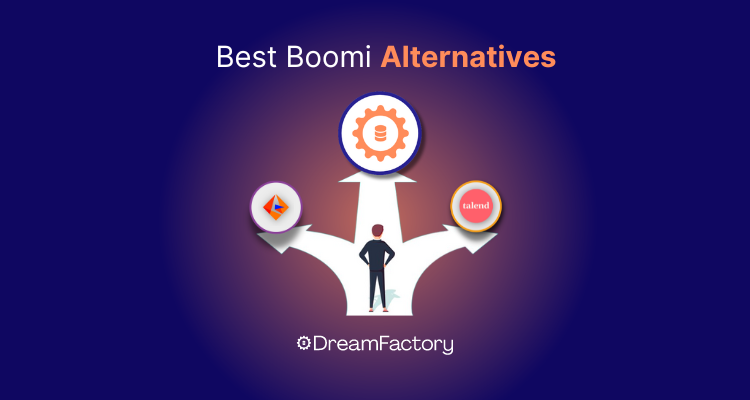Boomi, previously known as Dell Boomi, is a well-known software provider for enterprise integration. It manages all the information and data that needs to flow between different companies, systems, and applications. Boomi products are designed to offer the best possible performance with the lowest possible latency. However, not everyone can afford or has room in their budget for this particular product. In this article, we will explore three options that might be worth considering if you're looking for Boomi alternatives.
What Is Boomi?
Boomi is a cloud-based integration platform that manages all the information and data across different systems. Its no-code interface allows companies to integrate their data and applications without worrying about the underlying technology. The service has many different modules covering all aspects of integration, including API management, ETL (Extract, Transform, Load), file transfer, business process management, analytics and reporting hub, and a master data hub.
Key Features of Boomi
Its key features include a drag-and-drop interface for easy workflow configuration, pre-built connectors for rapid integration with popular SaaS applications and databases, real-time integration capabilities, and robust data governance tools. Additionally, Boomi's scalable architecture and analytics functionality enable organizations to manage and monitor integrations effectively, ensuring efficient and secure data exchange across diverse systems.
Pros and Cons of Boomi
There are several reasons why Boomi may not be right for your company and might be the reason why you are searching for Boomi alternatives.
Boomi offers a subscription-based pricing model, and the cost can vary widely depending on which features you want to use. If your business pays for Boomi’s premium features, prices start at $550 per month.
If your company is new to integration tools like Boomi, it may be best to test out other platforms first before making a final decision. This will allow your team to understand better how data integration works and determine whether or not they’re willing to invest in this type of solution. If you are evaluating a new platform, ensure that the interface is easy to use and familiar.
Boomi offers a comprehensive feature set, but it’s not always the best solution for every use case. If your company doesn’t need all of Boomi’s features, you may be better off looking at other options. This will allow your business to avoid paying for features that go underutilized. In contrast, DreamFactory has more flexible options in terms of the features they provide.
Boomi Alternatives
Here are 10 of the most interesting and prominent Boomi alternatives in the market right now.
1. DreamFactory

Rating: 4.4/5 on G2
If your business is looking for Boomi alternatives, DreamFactory is a great option. This solution is a cloud-based platform that connects and integrates applications, web services, and data.
DreamFactory offers different services such as:
- Data integration – This module lets you set up connections between your database or CRM (customer relationship management) tools like Salesforce and other third-party systems without writing code.
- Unlimited API creation – DreamFactory allows you to create REST APIs with just a few clicks. You can use these APIs for consumption across different platforms and devices, including web browsers, mobile devices, and more.
- Pre-built connectors – With this platform's hundreds of pre-built connectors, you can easily connect your apps with different cloud applications.
- Pipeline automation – You can use DreamFactory to set up automated workflows that automatically handle different processes in the background. This is ideal for business scenarios that might not require human involvement or where it will take too long before someone responds to a request manually.
Key Features of DreamFactory
DreamFactory is a very easy Boomi alternative to use. It doesn't require any coding skills or technical expertise, making it perfect for businesses of all sizes and budgets. Other benefits of this solution include:
- Scalability – DreamFactory is a scalable platform that quickly adapts to your organization's needs. Businesses can select on-premise or cloud-based setups to meet their needs.
- Flexibility – The design of this system supports nearly any type of database, cloud application, or API. This flexibility allows you to connect and integrate your data with a growing number of third-party tools at any time.
- Visual interface – This Boomi alternative has a visual drag & drop editor that facilitates quick integration by simply dragging and dropping different modules into place before customizing them further with just a few clicks.
2. Mulesoft

Rating: 4.5/5 on G2
Mulesoft is one of the most common Boomi alternatives for businesses looking to integrate their systems and data without writing any code. It features easy-to-use visual tools with drag & drop functionality to quickly set up connections between different applications. The platform also provides high availability in backup services and performance monitoring across cloud or on-premise deployments. Another benefit of this Boomi alternative is its support for almost 300 connectors available out-of-the-box, such as Salesforce, Marketo, etc.
Key Benefits of Mulesoft
Some of Mulesoft's many benefits are:
- Scalability - With Mulesoft, you can quickly scale your application infrastructure. Mulesoft is great for enterprise-level applications and can scale to meet the needs of large organizations.
- Secure - Mulesoft has built-in security features that make it perfect for large-scale enterprise operations.
- Connect apps and data – Mulesoft has a vast amount of out-of-the-box connectors like Marketo, Salesforce, etc., making it easy for users to connect their applications with different enterprise tools in no time at all.
3. Talend
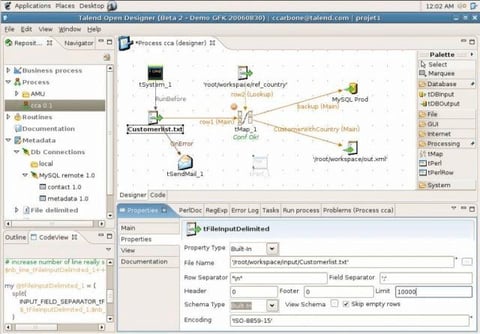
Rating 4/5 on G2
Talend is one of the most popular Boomi alternatives available in both open source and enterprise editions. This platform has a strong focus on big data analytics, so if this area of IT is critical to your business, you might consider it for your business operations.
Key Features of Talend
Talend has many benefits, including:
- Improved data quality – Talend helps you improve your data quality through its ETL (extract, transform, load) capabilities.
- Easy to use – This platform has an intuitive design that allows users to connect their applications with different cloud-based tools in no time. It also features visual development tools for non-technical business users or IT professionals who don't want to write code themselves.
- Multiple price points – Talend offers a free open source edition with limited functionality and an enterprise edition for purchase. These allow businesses to choose the correct version based on their requirements and budget.
- Large community – This Boomi alternative has a large community of users that share knowledge and experience to help each other out. This network makes it much easier for new users to get started with the platform and ensures that existing users always have access to support.
4. Informatica
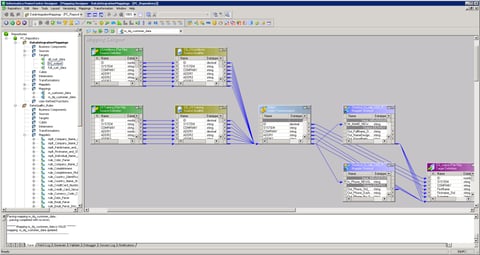
Rating: 4.2/5 on G2
Informatica's solutions are designed to help organizations solve complex data integration challenges, such as integrating data from disparate systems, ensuring data quality, and managing data governance. The company also offers a range of other products and solutions, including data quality, master data management, cloud data integration, and data security.
Key Features of Informatica
Some of Informatica's benefits are:
- Multi-cloud and Hybrid: Informatica supports the cloud model that best suits your business for migrating on-premises data
- Low code: By utilizing the capabilities of AI and machine learning within a single solution, the risk of custom coding can be mitigated.
- Open and Flexible: This cloud platform is designed to be compatible with any reference architecture, as it is built using industry-standard practices.
- Elastic and Serverless: This solution generates optimized performance while reducing costs and increasing scalability.
5. Workato

Rating: 4.7/5 on G2
Workato is an intelligent automation platform that enables businesses to automate their workflows and integrate their applications and systems without the need for custom coding. Founded in 2013, Workato's cloud-based platform uses a no-code, drag-and-drop interface that makes it easy for non-technical users to build and manage complex integrations between different applications, databases, and services. With over 500 pre-built connectors and the ability to connect to any application or system with an API, Workato allows businesses to streamline their operations, reduce manual work, and accelerate digital transformation.
Key Features of Workato
Some of Workato's benefits are:
- No-Code Platform: Workato is a no-code automation platform, which means that non-technical users can easily build and manage integrations between different applications and systems, without the need for custom coding.
- Wide Range of Integrations: Workato provides over a thousand pre-built connectors to commonly used business applications, databases, and services. This allows businesses to easily integrate and automate their workflows across various systems.
- Intelligent Automation: Workato's intelligent automation features enable businesses to automate complex workflows and tasks, such as data mapping, data transformation, and error handling.
- Scalability: Workato's cloud-based platform is designed to scale as your business grows. It can handle large volumes of data and automate high-volume processes with ease.
6. Celigo

Rating: 4.6/5 on G2
Celigo is a cloud-based integration platform that connects cloud applications and automates business processes. Celigo's platform is designed to help businesses streamline their operations, reduce manual work, and increase efficiency by automating data flows between different applications. With over 1500 pre-built integrations and the ability to create custom integrations, Celigo's platform is a comprehensive solution that can help businesses of all sizes to accelerate their digital transformation initiatives.
Key Features of Celigo
- Automation: Celigo's platform enables businesses to automate repetitive and manual tasks, increasing efficiency and reducing the risk of errors.
- Scalability: Celigo's platform is designed to scale as your business grows. It can handle large volumes of data and automate high-volume processes with ease.
- Real-time Sync: Celigo enables real-time synchronization of data between different systems, ensuring that businesses have access to the latest information across their entire organization.
- Cost-effective: Celigo is a cost-effective solution compared to traditional custom coding or other integration platforms. Its subscription-based pricing model allows businesses to scale up or down based on their needs.
7. Cleo Integration Cloud

Rating: 4.3/5 on G2
Cleo Integration Cloud is another Boomi alternative that is a cloud-based platform that enables businesses to integrate and automate their end-to-end workflows. It offers a comprehensive suite of integration solutions that allow enterprises to connect, transform, and seamlessly move data across their ecosystems, both on-premise and in the cloud.
Cleo Integration Cloud provides a range of features, including application connectors, data mapping and transformation, API management, analytics, and more. These features empower businesses with the ability to monitor, manage, and optimize their data flows in real-time.
Key Features of Cleo Integration Cloud
Some of Mulesoft's many benefits are:
- Rapidly establish connections with your trading partners through AS2, SFTP, FTPS, APIs, a secure portal, and additional methods. Facilitate any-to-any data transformation for both EDI, non-EDI, and APIs, satisfying all B2B requirements.
- Cleo allows you to uncover errors before they become problems with the ability to drill-down multiple layers into any integration flow or transaction.
- Greater visibility: The platform provides real-time visibility into data flows and transaction status, enabling organizations to monitor and manage their integrations more effectively.
- Enhanced security: Cleo offers advanced security features such as encryption, authentication, and access controls to protect sensitive data and ensure compliance with industry regulations.
8. SAP Integration Suite

Rating: 4.3/5 on G2
The SAP Integration Suite helps companies of all sizes and in all industries run better by redefining ERP and creating networks of intelligent enterprises that provide transparency, resiliency, and sustainability across supply chains. Its end-to-end suite of applications and services enables its customers to operate profitably, adapt continuously, and make a difference worldwide.
Key Features of SAP Integration Suite
Some of the benefits of using SAP are:
- Up-to-date Connectors: SAP's Prebuilt integrations managed and updated by SAP.
- Works well with your data stack: SAP integration suite is harmonized access to popular third-party cloud applications.
- Full API management: SAP gives business owners the ability to design, publish, and manage APIs.
- Harnesses Artificial Intelligence: SAP is equipped with AI-enabled cloud and hybrid integration development.
9. Jitterbit

Rating: 4.6/5 on G2
Jitterbit provides a combination of data integration (ETL) and API integration capabilities, including several pre-built API integrations for popular SaaS solutions, apps, and microservices. Additionally, the platform offers tools for creating ETL pipelines for data integration scenarios, such as the Jitterbit Cloud Data Loader (JCD), which manages Salesforce data connections. However, unlike MuleSoft, Jitterbit does not offer an ESB product.
As an API integration platform, Jitterbit offers an intuitive, point-and-click interface at a more affordable price than MuleSoft. It simplifies the process of exposing ODBC or JDBC databases as APIs, and it also includes an automatic REST API generation tool, similar to DreamFactory. This tool speeds up the development process and reduces labor costs.
Key Features of Jitterbit
- API integration: Jitterbit supports API integration with popular SaaS solutions, apps, and microservices. It offers a visual, point-and-click interface to simplify the process of exposing data as APIs.
- Pre-built integrations: Jitterbit comes with several pre-built API integrations for popular SaaS solutions, such as Salesforce, NetSuite, and Workday, which can help save development time and effort.
- ETL pipeline development: Jitterbit offers tools for creating ETL pipelines, such as the Jitterbit Cloud Data Loader (JCD), which helps manage Salesforce data connections.
10. Zapier

Rating: 4.5/5 on G2
Zapier is an API integration platform on training wheels, because Zapier offers basic API integration capabilities in an easy-to-use package. With its clickable, visual interface – and over 1,500 ready-to-use app integrations – the primary focus of Zapier is to help non-tech-savvy team members automate workflows between web- and cloud-based services.
While Zapier empowers non-developers to create simple workflows (called “Zaps”) that eliminate busywork without writing any code, users are limited to working with apps found in the Zapier portfolio. Users are completely limited to the point-and-click integration and automation features that Zapier allows. In this respect, Zapier is not designed for developers who want to build new applications and IT infrastructures, nor is it made for creating complex or specialized workflows.
Key Features of Zapier
Some of the many benefits of Zapier include:
- Easy automation: Zapier provides a user-friendly platform for automating tasks and workflows between various applications and services, without requiring any coding knowledge.
- Extensive app integrations: Zapier integrates with over 2,000 apps and services, including popular ones like Slack, Trello, Google Sheets, and Salesforce, providing a wide range of possibilities for automation.
- Custom workflows: Users can create custom workflows, or Zaps, to automate specific tasks and processes according to their unique needs.
- Flexibility: Zapier allows users to integrate different types of apps and services, including web apps, mobile apps, and even custom APIs.
11. Tray.io

Rating: 4.5/5 on G2
The Tray.io automation platform enables businesses to integrate and automate their workflows across multiple software applications. The platform offers a user-friendly interface that facilitates the design and deployment of integrations, enabling businesses to create intricate workflows even without technical expertise.
Key Features of Tray.io
Tray.io has many benefits including:
- Automation: Tray.io enables businesses to automate repetitive tasks and workflows across multiple software applications, reducing manual effort and increasing efficiency.
- Easy integration: The platform offers a user-friendly interface that simplifies the integration process, allowing businesses to connect various applications and services without the need for technical expertise.
- Custom workflows: Tray.io provides a flexible and customizable workflow builder that allows businesses to create unique workflows that fit their specific needs.
Why are Integration Platforms Important?
Integration platforms help simplify IT by connecting different systems. In doing so, they can access the data they need to make better business decisions. The main benefit of using an integration platform is having a single system for managing these connections, which means you only have one place to go when you need information from multiple sources. If your business is looking for Boomi as an integration solution, consider using Boomi alternatives like DreamFactory to help simplify your IT operations.
How to Pick an Alternative to Boomi
Boomi is a powerful integration platform, but its complexity, cost, and extensive feature set may not suit every business. To choose an alternative, start by identifying the specific systems and workflows you need to connect. Platforms like DreamFactory simplify API management with automated generation and support for diverse databases, while tools like Mulesoft and Talend cater to enterprise needs with advanced data processing capabilities.
Consider usability if your team lacks technical expertise—Tray.io and Zapier offer no-code, drag-and-drop interfaces that make integration straightforward. Scalability is essential for growth, and solutions like Workato and DreamFactory provide adaptable architectures that handle increasing data demands. Evaluate pricing to avoid paying for underutilized features, and ensure your choice includes robust security for compliance with data regulations.
DreamFactory is an excellent option, combining ease of use with powerful integration features, automatic API generation, and strong security. By focusing on your integration needs and comparing platforms carefully, you can select a solution that aligns with your goals without unnecessary complexity.
Get Started With DreamFactory
Developing APIs can be a complex, time consuming, and expensive process. It also exposes businesses to a number of risks including consistency, quality, and developer resourcing. DreamFactory is a REST API generation tool for 20+ databases and a range of other data sources. It gives you the ability to generate secure and fully documented APIs in a matter of minutes. Ready to get started?
Sign up for a 14-day free trial and start creating your APIs today!
This article was originally updated in 2024, but updated to add relevant information in 2025.
Related Reading
As a seasoned content moderator with a keen eye for detail and a passion for upholding the highest standards of quality and integrity in all of their work, Spencer Nguyen brings a professional yet empathetic approach to every task.




















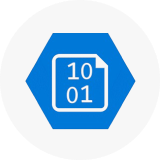
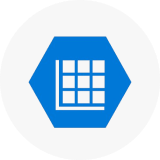


 Blog
Blog
